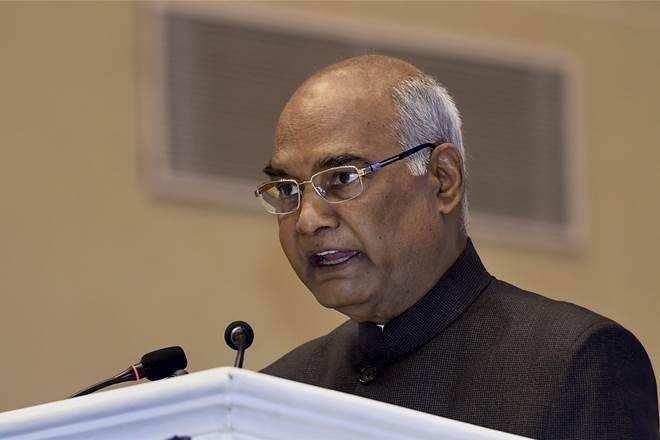Ram Nath Kovind administered oath to Justice Gogoi at brief ceremony in Rashtrapati Bhavan'

- Country:
- India
Justice Ranjan Gogoi was sworn in as the 46th chief justice of India on Wednesday after which he did some plain-speaking over urgent mentioning of cases in the Supreme Court for hearing, saying they will be disallowed till certain parameters are fixed unless someone is set to be "hanged or evicted".
Gogoi, 63, becomes the first person from the Northeast to reach the top position of the judiciary and will have a tenure of a little over 13 months. He will retire on November 17, 2019.
President Ram Nath Kovind administered the oath to Justice Gogoi at a brief ceremony in Rashtrapati Bhavan's historic Darbar Hall.
Justice Gogoi took the oath in English in the name of god. He succeeds Justice Dipak Misra who retired Tuesday on attaining the age of 65 years.
Several leaders, including Prime Minister Narendra Modi, his predecessor Manmohan Singh and former premier H D Deve Gowda were present at the ceremony.
"I congratulate Justice Ranjan Gogoi ji on taking oath as the Chief Justice of India. His experience, wisdom, insight and legal knowledge will benefit the country greatly. My best wishes for a fruitful tenure," Modi tweeted.
Justice Misra had earlier this month recommended Justice Gogoi as his successor in accordance with the established practice of naming the senior-most judge after the CJI for the top post.
Speculation over Justice Gogoi's appointment as the next CJI arose after the court's four most senior judges, including Justice Gogoi, called a press conference on January 11 and criticised Justice Misra on various issues, especially the manner of allocation of cases to certain benches.
Justices J Chelameswar (since retired), Madan B Lokur and Kurian Joseph were the others who addressed the press conference, perhaps a first in the history of the Indian judiciary.
After the swearing-in ceremony, Justice Gogoi came to the Supreme Court and presided over the bench along with Justices S K Kaul and K M Joseph in Court number 1 which is the CJi's court.
The new CJI began the day at the apex court by telling the lawyers that fresh parameters would be worked out for mentioning the matters for hearing those cases which required hearing on priority and urgent mentioning.
Justice Gogoi said "no urgent mentioning of cases will be allowed" till certain parameters are fixed for it.
"We will work out the parameters then we will see as to how mentioning will be done," he said.
"If somebody is going to be hanged or evicted tomorrow, then we can understand (urgency)", the CJI added.
Born on November 18, 1954, Justice Gogoi, who belongs to Dibrugarh in Assam, enrolled as an advocate in 1978. He practised in the Gauhati High Court on constitutional, taxation and company matters.
He was appointed a permanent judge of the Gauhati High Court on February 28, 2001.
On September 9, 2010, he was transferred to the Punjab and Haryana High Court. The following year, on February 12, 2011, he was appointed a chief justice of the Punjab and Haryana High Court and then a judge of the Supreme Court on April 23, 2012.
The Supreme Court website showed the roster of the work for fresh cases notified under the order of the CJI and with effect from October 3 till further orders.
The CJI has decided to keep with himself the PIL and the petitions based on the letter.
The bench headed by him will also deal with the matters relating to social justice, elections, company law, Monopoly and Restricted Trade Practices, Telephone Regulatory Authority of India, Security Exchange Board of India(SEBI), Insurance and Reserve Bank of India.
Justice Gogoi has also kept with himself matters concerning arbitration, habeas corpus, criminal cases, contempt of court and ordinary civil matters.
His bench will also deal with the issues relating to the appointment of Constitutional functionaries, statutory appointments and appointment of other law officers.
Besides the matters pertaining to the judicial officers and Commissions of Enquiry, would also be allocated before the bench headed by the CJI.
Justice Gogoi has also allocated the PIL and letter-based matters to the bench headed by Justice Lokur whose bench will also be seized with matters of land acquisition and requisition and service. Justice Lokur is the senior-most judge after the CJI.
Justice Lokur's bench, which is already allocated social justice matters, will continue with it along with the matters relating to forest, environment, wildlife and ecology.
Personal law matters, religious charitable endowments and issues of mines, minerals and mining leases would be allocated to the bench headed by Justice Lokur which will also take up the matters of land laws and agriculture tenancies, consumer protection and issues relating to armed forces and paramilitary.
Justice Kurian Joseph, who is third in seniority will have matters relating to labour, rent, service, family and criminal cases.
The bench headed by Justice Joseph would also share with the bench of CJI the matters relating to contempt of court.
The allocation of work for Justice Joseph also includes ordinary, civil, personal law along with religious and charitable endowments. His bench will also deal with simple money and mortgage matters.
His bench has also been assigned matters of land laws, agriculture and tenancy and also pertaining to the Supreme Court, High Courts, other courts and the tribunals.
(With inputs from agencies.)










